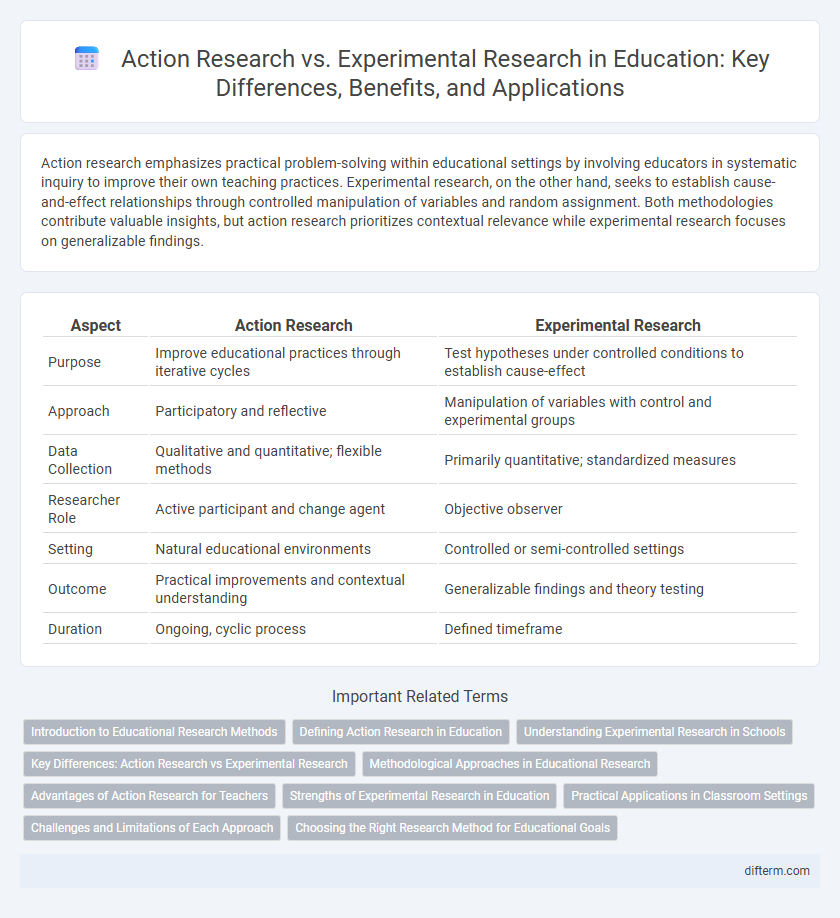Action research emphasizes practical problem-solving within educational settings by involving educators in systematic inquiry to improve their own teaching practices. Experimental research, on the other hand, seeks to establish cause-and-effect relationships through controlled manipulation of variables and random assignment. Both methodologies contribute valuable insights, but action research prioritizes contextual relevance while experimental research focuses on generalizable findings.
Table of Comparison
| Aspect | Action Research | Experimental Research |
|---|---|---|
| Purpose | Improve educational practices through iterative cycles | Test hypotheses under controlled conditions to establish cause-effect |
| Approach | Participatory and reflective | Manipulation of variables with control and experimental groups |
| Data Collection | Qualitative and quantitative; flexible methods | Primarily quantitative; standardized measures |
| Researcher Role | Active participant and change agent | Objective observer |
| Setting | Natural educational environments | Controlled or semi-controlled settings |
| Outcome | Practical improvements and contextual understanding | Generalizable findings and theory testing |
| Duration | Ongoing, cyclic process | Defined timeframe |
Introduction to Educational Research Methods
Action research in educational research methods emphasizes practical problem-solving through systematic inquiry conducted by educators within their own classrooms, fostering immediate application and reflection. Experimental research involves controlled manipulation of variables to establish cause-and-effect relationships, often utilizing randomized groups and statistical analysis for generalizable results. Both methodologies contribute uniquely to educational knowledge, with action research enhancing contextual understanding and experimental research supporting empirical validation.
Defining Action Research in Education
Action research in education involves educators systematically investigating their own teaching practices to improve student learning outcomes. This method emphasizes collaborative inquiry, reflective cycles, and practical problem-solving within real classroom settings. Unlike experimental research, action research prioritizes context-specific solutions and continuous improvement over controlled variables and generalizability.
Understanding Experimental Research in Schools
Experimental research in schools involves systematically manipulating variables to observe their effects on student outcomes, providing rigorous evidence for cause-and-effect relationships. This research design uses control groups and random assignment to minimize biases, ensuring reliability and validity in educational interventions. Understanding experimental research enhances educators' ability to implement data-driven strategies that improve teaching effectiveness and learning processes.
Key Differences: Action Research vs Experimental Research
Action research focuses on practical problem-solving within real classroom settings by involving educators in iterative cycles of planning, acting, observing, and reflecting, emphasizing immediate application and continuous improvement. Experimental research involves controlled manipulation of variables to establish cause-and-effect relationships, often employing randomized controlled trials, strict control groups, and statistical analysis to ensure validity and reliability. Key differences include action research's qualitative, participatory approach versus experimental research's quantitative, objective methodology aimed at generating generalizable knowledge.
Methodological Approaches in Educational Research
Action research in education emphasizes a cyclical process of planning, acting, observing, and reflecting to address immediate classroom challenges, fostering practitioner involvement and contextualized solutions. Experimental research employs controlled, systematic manipulation of variables to establish causal relationships and generalizable findings, often utilizing randomized control trials to enhance internal validity. While action research prioritizes practical application and iterative improvement, experimental research focuses on hypothesis testing and empirical rigor through quantitative data analysis.
Advantages of Action Research for Teachers
Action research empowers teachers to directly investigate and improve their classroom practices through real-time data collection and reflection, fostering immediate application of findings. This approach enhances teacher autonomy by encouraging collaborative problem-solving tailored to specific educational contexts, leading to more relevant and sustainable pedagogical improvements. The cyclical nature of action research promotes continuous professional development and responsive adaptation to student needs, which experimental research with rigid protocols may not accommodate.
Strengths of Experimental Research in Education
Experimental research in education offers strong control over variables, enabling precise determination of cause-and-effect relationships, which enhances the validity and reliability of findings. Its structured design allows for replication and generalization across diverse educational settings, providing robust evidence for instructional strategies and interventions. Quantitative data generated through experiments support statistical analysis, making it easier to evaluate the effectiveness of educational programs systematically.
Practical Applications in Classroom Settings
Action research in classroom settings emphasizes iterative cycles of planning, acting, observing, and reflecting, allowing educators to address specific instructional challenges and adapt strategies in real time. Experimental research involves controlled manipulation of variables to evaluate the efficacy of educational interventions, providing statistically significant evidence for best practices. Teachers use action research for immediate improvements and context-specific solutions, while experimental research informs broader educational policies and curriculum development.
Challenges and Limitations of Each Approach
Action research in education faces challenges such as researcher bias, limited generalizability due to small sample sizes, and time constraints within school schedules. Experimental research struggles with ethical concerns, controlling extraneous variables in real-world settings, and often requires significant resources for randomization and replication. Both approaches must navigate issues of validity and applicability, impacting their effectiveness in educational improvements.
Choosing the Right Research Method for Educational Goals
Action research in education emphasizes iterative problem-solving and teacher-led inquiry to improve instructional practices, fostering immediate classroom relevance. Experimental research prioritizes controlled conditions and variable manipulation to establish causality, supporting evidence-based policy and theory development. Selecting the appropriate method depends on educational goals: action research suits practical, context-specific improvements, while experimental research benefits generalizable, hypothesis-driven investigations.
action research vs experimental research Infographic

 difterm.com
difterm.com